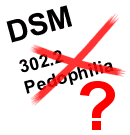|
被禁止的性行为与性暴力
|
|
成人与儿童的性接触:
娈童癖:强制治疗
|
|
 尽管有一些娈童癖者出于自愿去进行精神病治疗,但是他们大多数都是因为法庭的命令而不得不去进行这样的治疗。他们通常要经历某种形式的精神疗法,不过在特定的病例,治疗中可能要合并使用某些降低性欲的药物。大体上说,疗效不定。在大多数病例,娈童癖者对儿童的性兴趣仍旧积重难返,但是,如果他学会控制自己的性冲动,而且不触犯法律的底线,这也被认为是一个能够让人接受的结果。 尽管有一些娈童癖者出于自愿去进行精神病治疗,但是他们大多数都是因为法庭的命令而不得不去进行这样的治疗。他们通常要经历某种形式的精神疗法,不过在特定的病例,治疗中可能要合并使用某些降低性欲的药物。大体上说,疗效不定。在大多数病例,娈童癖者对儿童的性兴趣仍旧积重难返,但是,如果他学会控制自己的性冲动,而且不触犯法律的底线,这也被认为是一个能够让人接受的结果。
最近几年来,人们正在争论把娈童癖列入作为精神障碍名录中的性副态(paraphilia)的有用性议题。美国精神病诊断手册第四版(修订版)(DSM-IV-TR)因把娈童癖列入与下述障碍有关而受到质疑,即“具有临床诊断意义的痛苦或在社会交往、职业能力或其它个人能力发挥方面的损害”。对于批评者来说,这就意味着对他自己与儿童的性接触并不感到痛苦的成人,即感到有幸福感的成人,并不是娈童癖者。(当然,该手册的起草者绝无有意隐含这种暗示的意图。)另一方面,一些专家认为这个诊断手册的精神障碍名录怎么说也是被人误导了,因为它为娈童癖者找到便利的藉口打开了方便之门——如果他们有精神疾病,那么,他们毋需为自己的行为负法律责任(参见此处)。另有一些人因不同的理由而反对这个疾病名录:单以这种行为是不道德行为和/或犯罪行为事实本身,就不必要把它弄成什么疾病的综合征。那么,如果这种行为是被社会所接纳的,正如曾经在不同的文化里和历史各个时期所呈现的一样,这又该作何种解释?对那些对儿童有某种性幻想的非娈童癖者又该如何解释或处理?如果他们也把这些性幻想付诸行动又该怎样对待?那么,最后还要问一问,对那些戒除与儿童有任何性接触的娈童癖者该如何待之?依据什么标准能够或应该把他们称为精神病患者?难道为了精神病学的利益要把该学科本身打造成“思想卫道士”吗?精神病学只是去对付公然的性行动不是更好吗?我们不应该把道德的事物让渡于道德家,也不应该把犯罪行为委托给立法机构、警察和法庭去处理吗?[1]
[1]. Richard Green, MD, JD,
“Is Pedophilia a Mental Disorder?”, Archives of Sexual Behavior, vol. 31, Nr. 6
|
|
Prohibited Sexual Behavior and Sexual Violence
|
|
Adult Sexual Contact with Children: Pedophilia 3
|
|
 Most pedophiles who appear for psychiatric treatment do so because of a court order, although some also volunteer. They usually undergo some form of psychotherapy, but in certain cases this may be combined with some medication that dampens their sexual urges. On the whole, the therapeutic success is uncertain. In most cases, the pedophile’s sexual interest in children remains, but if he learns to control his impulses and to stay clear of the law, one considers it an acceptable outcome. Most pedophiles who appear for psychiatric treatment do so because of a court order, although some also volunteer. They usually undergo some form of psychotherapy, but in certain cases this may be combined with some medication that dampens their sexual urges. On the whole, the therapeutic success is uncertain. In most cases, the pedophile’s sexual interest in children remains, but if he learns to control his impulses and to stay clear of the law, one considers it an acceptable outcome.
In recent years, a debate has arisen about the usefulness of listing pedophilia among the paraphilias as a mental disorder. The American diagnostic handbook (DSM-IV-TR) has been criticized for specifying that pedophilia is associated with
“clinically significant distress or impairment in social, occupational, or other important areas of functioning”. For the critics, this implies that a happily functioning adult who is not distressed by his sexual contact with children is not a pedophile. (The authors of the handbook, however, never intended this implication.) On the other hand, some specialists believe that the DSM listing is misguided in any case, because it provides pedophiles with a convenient excuse – if they are mentally ill, they are not responsible for their behavior (see
here). Others object to the listing for a different reason: The fact alone that a behavior is immoral and/or criminal does not necessarily make it a symptom of illness. And what if the behavior is socially accepted as it was in various cultures and various times? Were all the adults involved mentally ill? What about non-pedophiles who have some erotic fantasies about children? What if they also act on these fantasies? And finally: What about the pedophile who refrains from any sexual contact with children? By what criterion can or should he be called mentally disordered? Is it in the interest of psychiatry to establish itself as a “thought police”? Isn’t it better to deal only with overt sexual acts? Shouldn’t one leave morality to the moral authorities and crime to the legislatures, the police, and the courts? (1)
(1) Richard Green, MD, JD,
“Is Pedophilia a Mental Disorder?”, Archives of Sexual Behavior, vol. 31, Nr. 6
|